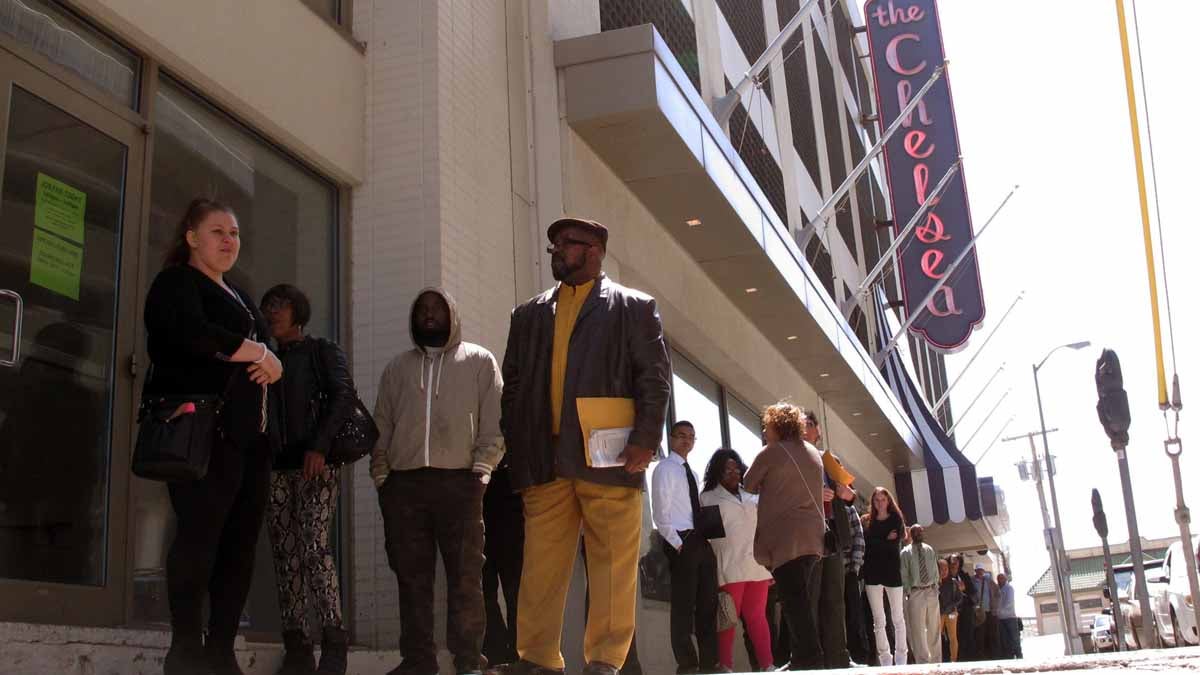As casino industry falters, food stamp use up 12 percent in Atlantic County

Ronald Roberts, right, waits at the head of the line of applicants for jobs at the Chelsea hotel in Atlantic City last month. Roberts lost his cook's job last August when the Showboat casino closed. Many laid-off casino workers were among those seeking jobs at the Chelsea, even three-month temporary seasonal positions. (AP Photo/Wayne Parry)
Atlantic County Administrator Jerry Del Rosso has lived and worked in the Atlantic City area all his life.
“It’s always been a tourism area,” said Del Rosso. “It was vibrant from May through right after the Miss America pageant, then you’d have conventions in the winter. but for the most part the city didn’t have a lot of other industry.”
As the casinos took hold in the early ’80s, they allowed the town to function year round with plenty of jobs, he said.
“So what happens is as your major industry begins to be impacted by competition from surrounding states and they begin to close, there’s not a whole lot of other businesses for those workers to migrate to,” said Del Rosso.
With four Atlantic City casinos closing in the past year, residents are indeed feeling the economic effects. A report last week found that the number of households using food stamps rose 12 percent over the past year in Atlantic County.
Nearly a third of Atlantic County’s 300,000 residents now receive government assistance — totaling almost $100 million over the past year.
What’s more, a 16-year study by Harvard University researchers released last week found that the geographic area in which poor children grow up does affect their upward economic mobility — and it rated Atlantic County as among the worst areas in the nation.
A 26-year-old from the area stands to earn 17 percent less than peers from the same economic background nationally, according to the study, which noted the county’s median income is the lowest in New Jersey.
County officials began discussions of an aviation and research technology park, in association with Stockton University, a few years ago, Del Rosso said, estimating that type of industry could provide thousands of jobs in an area.
“Hopefully, with these plans, we will help diversify and give opportunities — higher-paying jobs, which require higher types of education, and that will drive some of the individuals in this area to go back for college and aspire for these jobs,” he said. “That’s the key here.”
Almost 8,000 people lost their jobs when four of the 12 major Atlantic City casinos shuttered their doors over the past year.
Nearly 47,000 people over the past year were approved to become part of the New Jersey SNAP, or food stamp program, including more than 20,000 children. Over that same time period, the total of New Jersey residents applying for food stamps rose 6 percent.
“I don’t want to seem myopic, but my primary responsibility is to assess individuals, if they’re eligible, to provide that benefit,” said Forrest Gilmore, director of the county Department of Family and Economic Assistance. “As far as the economic development, as a professional, I have to stay focused on our task.”
His department budget will go up by 8 percent this year, and has risen nearly 64 percent over the past decade.
WHYY is your source for fact-based, in-depth journalism and information. As a nonprofit organization, we rely on financial support from readers like you. Please give today.




